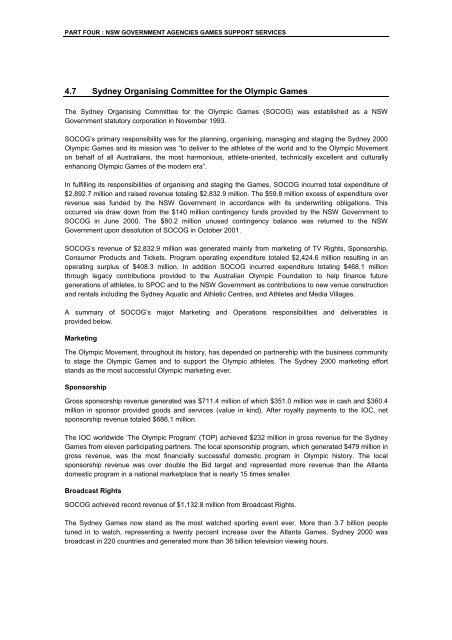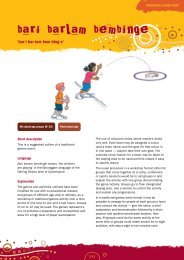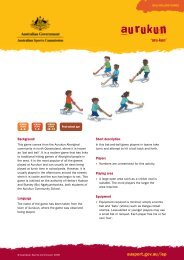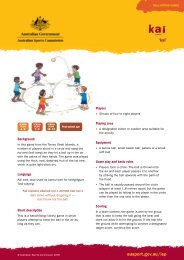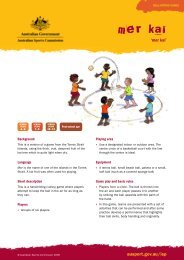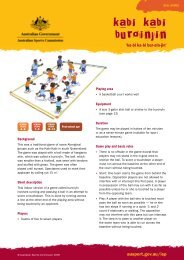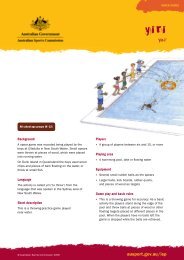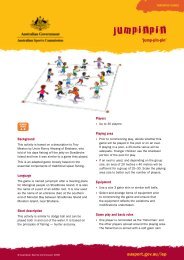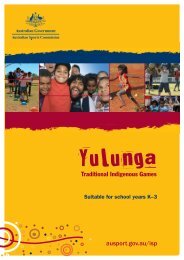the sydney 2000 olympic and paralympic games - Australian Sports ...
the sydney 2000 olympic and paralympic games - Australian Sports ...
the sydney 2000 olympic and paralympic games - Australian Sports ...
You also want an ePaper? Increase the reach of your titles
YUMPU automatically turns print PDFs into web optimized ePapers that Google loves.
PART FOUR : NSW GOVERNMENT AGENCIES GAMES SUPPORT SERVICES<br />
4.7 Sydney Organising Committee for <strong>the</strong> Olympic Games<br />
The Sydney Organising Committee for <strong>the</strong> Olympic Games (SOCOG) was established as a NSW<br />
Government statutory corporation in November 1993.<br />
SOCOG’s primary responsibility was for <strong>the</strong> planning, organising, managing <strong>and</strong> staging <strong>the</strong> Sydney <strong>2000</strong><br />
Olympic Games <strong>and</strong> its mission was “to deliver to <strong>the</strong> athletes of <strong>the</strong> world <strong>and</strong> to <strong>the</strong> Olympic Movement<br />
on behalf of all <strong>Australian</strong>s, <strong>the</strong> most harmonious, athlete-oriented, technically excellent <strong>and</strong> culturally<br />
enhancing Olympic Games of <strong>the</strong> modern era”.<br />
In fulfilling its responsibilities of organising <strong>and</strong> staging <strong>the</strong> Games, SOCOG incurred total expenditure of<br />
$2,892.7 million <strong>and</strong> raised revenue totaling $2,832.9 million. The $59.8 million excess of expenditure over<br />
revenue was funded by <strong>the</strong> NSW Government in accordance with its underwriting obligations. This<br />
occurred via draw down from <strong>the</strong> $140 million contingency funds provided by <strong>the</strong> NSW Government to<br />
SOCOG in June <strong>2000</strong>. The $80.2 million unused contingency balance was returned to <strong>the</strong> NSW<br />
Government upon dissolution of SOCOG in October 2001.<br />
SOCOG’s revenue of $2,832.9 million was generated mainly from marketing of TV Rights, Sponsorship,<br />
Consumer Products <strong>and</strong> Tickets. Program operating expenditure totaled $2,424.6 million resulting in an<br />
operating surplus of $408.3 million. In addition SOCOG incurred expenditure totaling $468.1 million<br />
through legacy contributions provided to <strong>the</strong> <strong>Australian</strong> Olympic Foundation to help finance future<br />
generations of athletes, to SPOC <strong>and</strong> to <strong>the</strong> NSW Government as contributions to new venue construction<br />
<strong>and</strong> rentals including <strong>the</strong> Sydney Aquatic <strong>and</strong> Athletic Centres, <strong>and</strong> Athletes <strong>and</strong> Media Villages.<br />
A summary of SOCOG’s major Marketing <strong>and</strong> Operations responsibilities <strong>and</strong> deliverables is<br />
provided below.<br />
Marketing<br />
The Olympic Movement, throughout its history, has depended on partnership with <strong>the</strong> business community<br />
to stage <strong>the</strong> Olympic Games <strong>and</strong> to support <strong>the</strong> Olympic athletes. The Sydney <strong>2000</strong> marketing effort<br />
st<strong>and</strong>s as <strong>the</strong> most successful Olympic marketing ever.<br />
Sponsorship<br />
Gross sponsorship revenue generated was $711.4 million of which $351.0 million was in cash <strong>and</strong> $360.4<br />
million in sponsor provided goods <strong>and</strong> services (value in kind). After royalty payments to <strong>the</strong> IOC, net<br />
sponsorship revenue totaled $686.1 million.<br />
The IOC worldwide ‘The Olympic Program’ (TOP) achieved $232 million in gross revenue for <strong>the</strong> Sydney<br />
Games from eleven participating partners. The local sponsorship program, which generated $479 million in<br />
gross revenue, was <strong>the</strong> most financially successful domestic program in Olympic history. The local<br />
sponsorship revenue was over double <strong>the</strong> Bid target <strong>and</strong> represented more revenue than <strong>the</strong> Atlanta<br />
domestic program in a national marketplace that is nearly 15 times smaller.<br />
Broadcast Rights<br />
SOCOG achieved record revenue of $1,132.8 million from Broadcast Rights.<br />
The Sydney Games now st<strong>and</strong> as <strong>the</strong> most watched sporting event ever. More than 3.7 billion people<br />
tuned in to watch, representing a twenty percent increase over <strong>the</strong> Atlanta Games. Sydney <strong>2000</strong> was<br />
broadcast in 220 countries <strong>and</strong> generated more than 36 billion television viewing hours.


